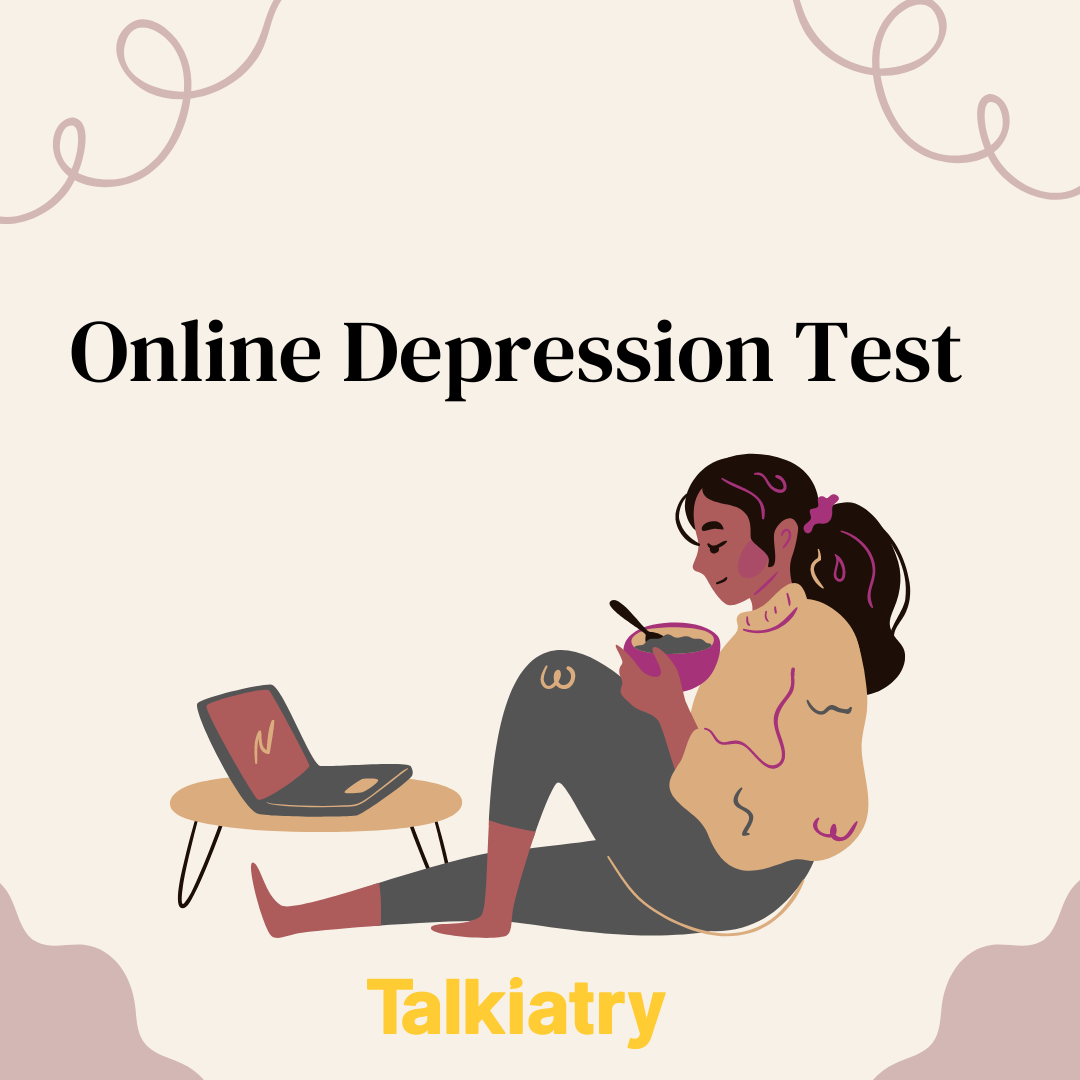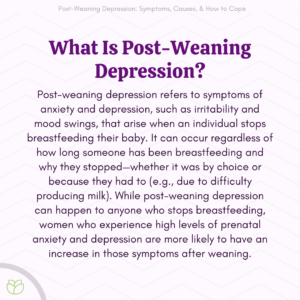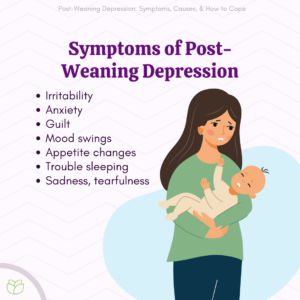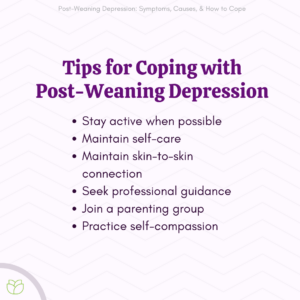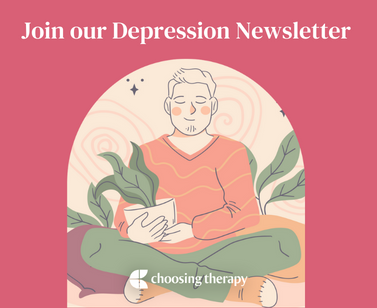Post-weaning depression can develop after stopping breastfeeding, leading to intense mood swings and feelings of melancholy and sadness. Post-weaning depression may affect mothers who are weaning by choice or by circumstance and isn’t dependent upon how long the breastfeeding experience lasts. Instead, it’s believed to result from a combination of hormonal fluctuations and the psychological stress of weaning.
Depression Is Treatable With Therapy Would you like to feel more happiness and joy? BetterHelp has over 20,000 licensed therapists who provide convenient and affordable online therapy. BetterHelp starts at $65 per week. Take a Free Online Assessment and get matched with the right therapist for you.
What Is Post-Weaning Depression?
Post-weaning depression refers to symptoms of anxiety and depression, such as irritability and mood swings, that arise when an individual stops breastfeeding their baby. It can occur regardless of how long someone has been breastfeeding and why they stopped—whether it was by choice or because they had to (e.g., due to difficulty producing milk). While post-weaning depression can happen to anyone who stops breastfeeding, women who experience high levels of prenatal anxiety and depression are more likely to have an increase in those symptoms after weaning.1
It is thought that post-weaning depression occurs in part due to hormonal factors. The process of weaning means a reduction in the breastfeeding hormones oxytocin and prolactin, which promote relaxation, reduce the stress response, and improve maternal mood.1,2 Post-weaning depression may also be a result of emotional factors; weaning creates a boundary between you and your baby who has relied on you, at least in part, for nutrition and comfort. Through the weaning process, your baby begins to receive nourishment from a bottle (and possibly solid food if your baby is old enough) and comfort through other activities like self-soothing. Weaning can represent a shift in your identity, your relationship with your baby, and how you spend your time.
The term post-weaning depression describes an experience but is not a clinical diagnosis. It can co-occur with postpartum depression. However, there are ways to help reduce your vulnerability to post-weaning depression and to get help.
How Long Does Post-Weaning Depression Last?
Symptoms of post-weaning depression typically last a few weeks as you adjust to the changes in your body and lifestyle. If the symptoms do not go away within a month, reach out for support, such as a therapist or a supportive parenting group. Keep in mind: it is never too early to reach out for help, and you certainly don’t have to wait to see if symptoms disappear.
As a parent to a new baby, you are in a state of many transitions, and having support can help you feel better and be more present with your family. Evidence suggests that untreated maternal depression and anxiety are risk factors for the well-being of children and the family, so taking care of yourself is especially important.3
Post-Weaning Depression Vs. Postpartum Depression
Post-weaning depression is a term that describes symptoms of anxiety or depression as a result of weaning. It may co-occur with postpartum depression, which is more severe than baby blues, a term used to describe mild symptoms of anxiety and depression that occur in the first two weeks after giving birth. Whether your symptoms are mild or severe, all of these experiences are significant for the mental health of both parent and baby. Parents need not wait until they have severe symptoms of depression to seek help, especially because your experience of depression can affect your children, as well.
Symptoms of Post-Weaning Depression
Post-weaning depression symptoms may vary depending on the individual. Because weaning involves hormonal and emotional changes, symptoms can be physical and mental.
Symptoms of post-weaning depression may include:
- Irritability
- Anxiety
- Guilt
- Mood swings
- Appetite changes
- Trouble sleeping
- Sadness, tearfulness
Help For Depression BetterHelp – Get help from a licensed therapist. BetterHelp offers convenient and affordable online therapy starting at $65 per week. Free Assessment Talkspace – Online Therapy With Or Without Insurance. Talkspace accepts many insurance plans including Optum, Cigna, and Aetna. Typical co-pay is $30, but often less. Get started
What Causes Post-Weaning Depression?
Post-weaning depression can occur for several reasons, both hormonal and emotional. Those who experienced prenatal anxiety and depression are more likely to have increased symptoms after stopping breastfeeding.
Post-weaning depression may be caused by:
Mom Guilt
Mom guilt, or the feeling that you are not doing enough for your kids, can contribute to post-weaning depression, whether you stopped breastfeeding voluntarily or not. Cultural messages or “mom shaming” about how long or how much you “should” breastfeed can make you feel like you are coming up short by weaning your baby.
Hormonal Changes
Hormonal changes after giving birth may contribute to post-weaning depression. Breastfeeding produces “feel good” hormones that can feel out of balance after weaning a baby. You may feel different without oxytocin and prolactin, which buffer against negative moods when you are breastfeeding.1
Changes in Identity
Weaning a baby may result in an identity crisis in mothers. When breastfeeding, you are someone’s source of food and comfort. As difficult and tiring as that is, it gives you a sense of purpose and identity. When you stop breastfeeding, the shift in your role can contribute to feelings of sadness or worry. You may wonder if your baby really needs you anymore or if you will ever be as important in his life. It is essential to remember your baby still needs you and will for a long time. Practice finding new ways to connect with your baby, like walking or playing.
Transition in how you spend your time
Pumping and/or breastfeeding probably kept you busy and may have even felt like a full-time job. Weaning is a transition in how you spend your time. At first, you may feel like you don’t know what to do with yourself and may not remember what life was like before feeding a baby. Be patient as you rediscover things that give you joy and purpose outside of breastfeeding. Your feelings of sadness/worry are always valid, but remembering that they are temporary may help you get through the transition.
Can Post-Weaning Depression Be Prevented?
Being informed about post-weaning depression can help you plan ahead for any symptoms that may come up and reduce your vulnerability to experiencing them intensely. Knowing that you will go through hormonal and emotional changes is a great first step so you are not caught off guard and can have tools available to help.
Some tips for managing the risk of post-weaning depression are:
- Wean your baby gradually: Rather than stopping abruptly, gradual weaning gives your body and brain time to adjust to your new relationship with your baby. It will also make the hormonal changes that you experience less intense.
- Wean when you are ready to: Rather than worrying about what others say is normal or what you “should” do, focus on what feels right for you and your baby and what is healthy for both of you, according to your pediatrician.
- Talk about how you feel: Talking to someone else who has been through weaning can be a helpful way to acknowledge and validate your emotions rather than suppressing them, which often just makes emotions more intense and painful.
- Focus on some of the new positives: Letting go of breastfeeding your baby can be hard, but there may be some new positives that come from it, as well. It may be helpful to acknowledge these, such as noticing that your baby is more alert and interactive with you now that they are older, or you don’t have to worry about pumping, leaking, or getting mastitis anymore.
Depression Is Treatable With Therapy Would you like to feel more happiness and joy? BetterHelp has over 20,000 licensed therapists who provide convenient and affordable online therapy. BetterHelp starts at $65 per week. Take a Free Online Assessment and get matched with the right therapist for you.
6 Ways to Cope With Post-Weaning Depression
Fortunately, there are ways to cope with and recover from post-weaning depression, such as focusing on self-care, which can help increase your emotional resilience.
Here are six tips for coping with post-weaning depression:
1. Stay Active When Possible
The mental health benefits of exercise can help you get through this temporary period. Set an achievable goal to start and build gradually so you don’t feel defeated. Maybe you aim for 20 minutes of movement every day. Even taking your baby for a walk around the block or stretching for a few minutes during a nap can be beneficial.
2. Maintain Self-Care
There are many benefits of self-care and many methods of practicing it. For example, you can pick up a new hobby that fits into your busy schedule, try meditation for depression, start journaling, or try to eat nutritious meals. Self-care is an important way to avoid mom burnout.
3. Maintain Skin-to-Skin Connection
Cuddling and skin-to-skin contact with your baby are helpful ways to cope with post-weaning depression. Skin-to-skin contact releases the hormone oxytocin, and cuddling can help you continue to feel emotionally and physically connected to your baby even though you are no longer breastfeeding.4
4. Seek Professional Guidance
If you are feeling symptoms of post-weaning depression, remember that it is always an option to seek professional help. Online therapy may be especially helpful for those with a new baby at home. You may want to consider options for depression therapy, such as Cognitive Behavioral Therapy (CBT) or Acceptance and Commitment Therapy (ACT).4
5. Join a Parenting Group
Parenting groups are a great way to normalize what you are going through with post-weaning depression by talking to other parents who have or are going through the same thing. A group can also help you build a community of parents you can reach out to when you need help.
6. Practice Self-Compassion
If you are a parent experiencing post-weaning depression, having some kindness with yourself can go a long way. Notice how you are talking to yourself when things are hard—is your tendency to blame yourself for parenting mistakes or to think of ways you could have done something better? Taking a self-compassion break is a short, easy way to help alleviate suffering and practice being kind to yourself even through an experience like post-weaning depression.4
In My Experience
For many parents, having a new baby is one of the most physically and emotionally demanding periods. No matter how many books you read or parenting classes you take to get ready (and even if you already have children), nothing can truly prepare you for the experience of a brand-new person entering your life. In my experience, the most important things you can do are to have self-compassion and reach out for help. Remembering to treat yourself with kindness can help you manage post-weaning depression or whatever else comes your way without adding self-judgment. Reaching out to friends, family, and professionals can help you navigate this transition, and keep in mind that you are not alone.
Additional Resources
To help our readers take the next step in their mental health journey, Choosing Therapy has partnered with leaders in mental health and wellness. Choosing Therapy is compensated for marketing by the companies included below.
Talk Therapy
Online-Therapy.com – Get support and guidance from a licensed therapist. Online-Therapy.com provides 45 minute weekly video sessions and unlimited text messaging with your therapist for only $64/week. Get Started
Online Psychiatry
Hims / Hers If you’re living with anxiety or depression, finding the right medication match may make all the difference. Connect with a licensed healthcare provider in just 12 – 48 hours. Explore FDA-approved treatment options and get free shipping, if prescribed. No insurance required. Get Started
Depression Newsletter
A free newsletter from Choosing Therapy for those impacted by depression. Get helpful tips and the latest information. Sign Up
Learn Anti-Stress & Relaxation Techniques
Mindfulness.com – Change your life by practicing mindfulness. In a few minutes a day, you can start developing mindfulness and meditation skills. Free Trial
Choosing Therapy Directory
You can search for therapists by specialty, experience, insurance, or price, and location. Find a therapist today.
Online Depression Test A few questions from Talkiatry can help you understand your symptoms and give you a recommendation for what to do next. Best Online Psychiatry Services Online psychiatry, sometimes called telepsychiatry, platforms offer medication management by phone, video, or secure messaging for a variety of mental health conditions. In some cases, online psychiatry may be more affordable than seeing an in-person provider. Mental health treatment has expanded to include many online psychiatry and therapy services. With so many choices, it can feel overwhelming to find the one that is right for you.